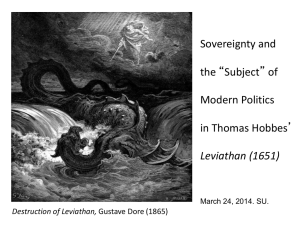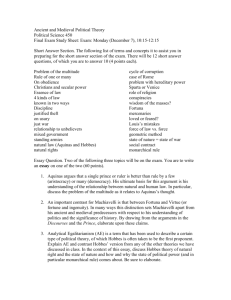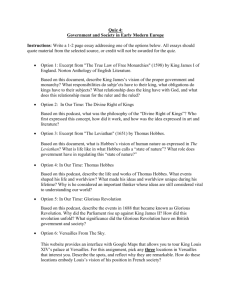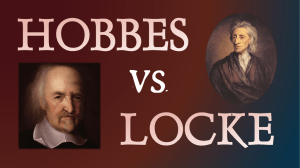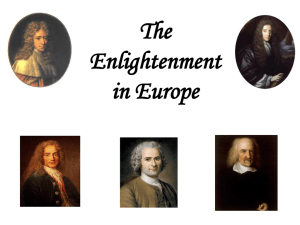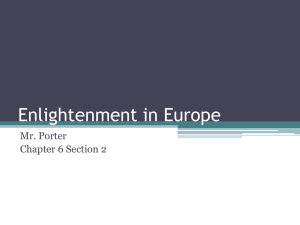what role does the state of nature play in hobbes` political theory
advertisement
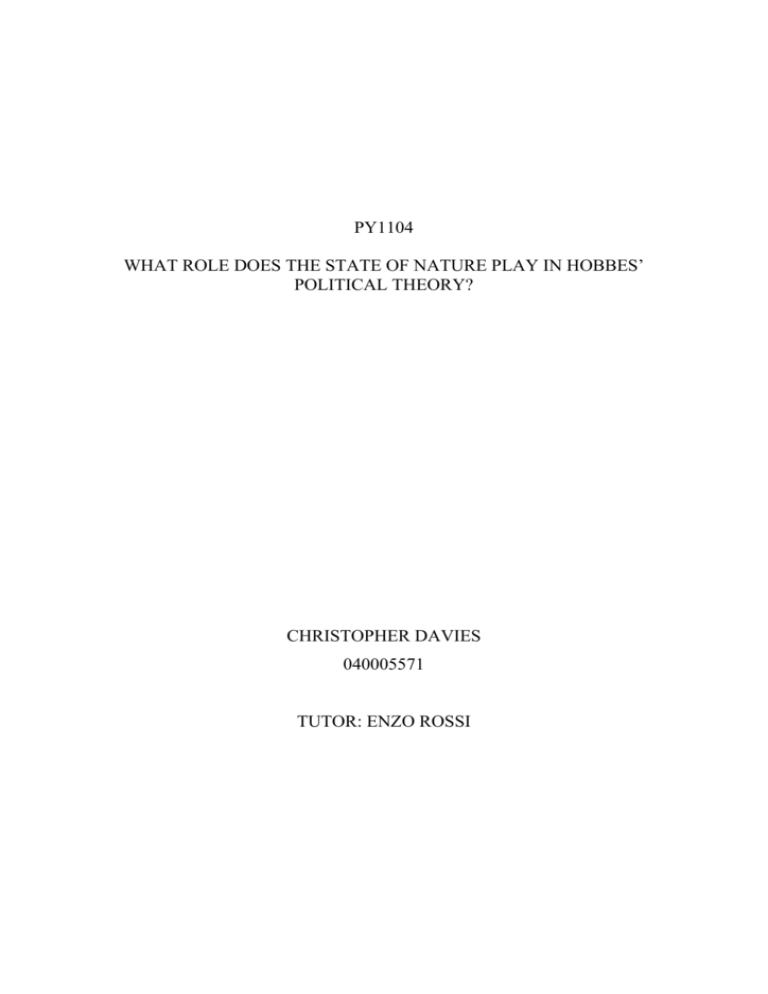
PY1104 WHAT ROLE DOES THE STATE OF NATURE PLAY IN HOBBES’ POLITICAL THEORY? CHRISTOPHER DAVIES 040005571 TUTOR: ENZO ROSSI In Leviathan, Hobbes explicitly sets out his moral and political philosophy with regard to human nature, – that is how humans behave amongst each other as a social animal – the state of nature – the natural condition of human interaction as a result of their nature – and thus his political theory – that of an absolute sovereign in whom the power of the people is invested. Of these steps, (1. Human Nature; 2. State of Nature; and 3. Political Theory) for Hobbes, it is fundamentally necessary that the preceding occurs for the proceeding to come about, and thus, the state of nature is essential in Hobbes’ construction of a political theory. In order to prove this, the following will, firstly, analyse Hobbes’ conceptions of human nature and as a result the state of nature; secondly, discuss whether this necessarily leads to Hobbes’ political theory; and thirdly, if so, does his argument, in its entirety, prove to be both valid and true. The single most important argument as regards to Hobbes’ conception of human nature is that of its pessimism, as it is this pessimistic view that brings Hobbes to his conclusion that the state of nature is as objectionable as his view describes it to us. Hobbes argues that every man is characterised by his view that, despite a few who, through mutual recognition or admiration, he believes to be his equal, he is endowed most liberally with the faculty of wisdom.1 In this way, contends Hobbes, all men are equal in that they all believe the same of themselves, and thus, their equal stature fosters an equality in desires and their ability, in their own minds, to realise them. The result of this is that where men desire what they cannot both have, they become mistrustful, and through this, enemies.2 Life according to Hobbes is an egoistic quest for the satiation of desires3, and on the way to this end, men will endeavour to ‘destroy and subdue’ one another, a factor which is instrumental in establishing Hobbes’ account of the state of nature. It is, however, not only for the augmentation of currently enjoyed powers that men pursue this egoistic course of self-help, but also merely as means of conservation – “the cause of this is not always that a man hopes for a more intensive delight than he has already attained to… but he cannot assure the power and means to live well… without the acquisition of more.”4 In this way, because all men desire conservation, where they can’t all have it, they anticipate that 1 Leviathan, p.61 Leviathan, p61 3 Leviathan, p.47 4 Leviathan, p.47 2 those who desire it along with them will try and take it away. Consequently, man will, through any means possible, attempt to gain power over as many men as he can, until his power is so great that he cannot see any other who could harm him. Men also seek glory, however, and it is inherent in their nature to do so. Hobbes distinguishes men from other types of social animals, in chapter 17 for example, drawing a comparison with bees and ants. Men are distinct, he says, in that they are concerned with glory – where for bees and ants there is no difference between the public and the private gain, men are concerned with their gain as individuals, and in relation to that of other men. “And consequently among men”, he contends, “there ariseth on that ground, envy, hatred, and finally war; but amongst these [ants and bees] not so.”5 It is therefore on three main grounds that men disagree – ‘competition’, ‘diffidence’, and ‘glory’, and it is the resultant self-interested acts of men that set out the foundations upon which Hobbes’ vision of the state of nature is constructed. Hobbes’ state of nature, therefore, is one that is as equally pessimistic as his view of human nature. The state of nature, for Hobbes, is that of anarchy, in the sense that there is no over-arching power to constrain the actions of men, and is one in which there are limited resources. Man is thus driven by his desires as described above, and in that all men are essentially free, pursues them forsaking all others. As resources are limited, and all men have the same essential desires, not everyone has the ability to realise these desires. The result of this is a state which Hobbes calls war “of every man against every man”.6 Hobbes can be no plainer in his explanation than with the following: At this time, he says, there is “continual fear, and danger of violent death; and the life of man is solitary, poor, nasty, brutish and short”.7 Consequently, as a product of the state of war against all and man’s need to use all he can in order to guarantee his conservation, it follows, Hobbes says, that “every man has a right to every thing; even to one another’s body. And therefore, as long as this natural right of every man to every thing endureth, there can be no security to any man.”8 Therefore, in the state of nature there are no rights of property, or even rights of self, in that everyone else has a right to what you take as yours. It is upon this assumption that Hobbes bases his idea of man’s willingness to relinquish his absolute 5 Leviathan, p.86 Leviathan, p.62 7 Leviathan, p.62 8 Leviathan, p.64 6 liberty, through pure self-interest, in favour of a system by which he will be satisfied with as much liberty against men, as he would allow them to take of him.9 Man, thereby, forms a covenant amongst himself to surrender his this right to all to Hobbes’ Leviathan – an absolute sovereign who is the ultimate arbiter in all cases: The greatest power, says Hobbes, is that which is invested in one person, by all people.10 For Hobbes, this is the necessary and sufficient condition, which must be satisfied in order for man to escape the sate of nature. Whether this power is invested in one person, or many men, is not fundamentally important. The most important thing, however, is that the power is absolute in its nature. Where many people may appeal to alternative sources of power, such as an objective moral law – that which is right through some reason other than the rule of the sovereign, be its source religion or rationality in a Kantian sense – or inherent property rights, a constitution limiting sovereign power, or divided sovereignty between different branches of government, Hobbes maintains that in order to escape the state of nature we must only recognise the rule of the sovereign as the legitimate source of power. This is because; in recognising alternative sources of power we risk a return to the state of nature, as when sovereignty is divided the two branches will, as is natural, compete, and the state of war will follow. In the case of a constitution or higher moral code, because human disagreement is all pervasive, an external arbiter will be necessary to interpret this for the people, and as a result of this sovereignty is divided. The same is the case for shared sovereignty between branches of government, and thus it follows that the only way to escape the state of nature is to recognise one individual as possessing sovereignty in its most absolute form. It is clear, therefore, how the state of nature is instrumental in Hobbes’ idea that sovereignty must be absolute, as it is its harsh behavioural precepts that ensure that sovereignty cannot be divided if we are to successfully escape its grip. It is perhaps dubious, however, whether people can create, through covenant, a sovereign in the Hobbesian sense – whose power is absolute and permanent. For the power of the sovereign is surely only real where the people obey his commands, and thus where the people believe that, through rationality, that the sovereign’s commands are not in alignment with their self-interest then they will disobey these commands. In 9 Leviathan, p.65 Leviathan, p.41 10 a scenario, therefore, where the self-interest of the people was so much at odds with the will of the sovereign then the sovereign no longer has power. In conclusion, the state of nature plays a crucial role in the formation of Hobbes political theory that the power of a sovereign should be absolute. It is Hobbes’ state of nature in itself, arrived at through an analysis of human nature, that sets out the conditions – that of the self-serving nature of man, and the resulting state of war against all – for the only way to escape the state of nature, to be the adoption of an absolute sovereign, as pursuing the course of divided sovereignty in any sense, risks a return to the state of nature. It follows therefore, that while there may be dubiety regarding man’s ability to create such a sovereign through covenant, assuming Hobbes’ premises to be correct, his characterisation of the state of nature is completely fundamental to the claim that sovereignty should be absolute. Bibliography: Thomas Hobbes, Leviathan, Richard Tuck (ed.) (Cambridge: Cambridge University Press, 1996) Murray Forsyth, Leviathan: Thomas Hobbes in The Political Classics, M. Forsyth and M. Keens-Soper (eds.), (Oxford: Oxford University Press, 2003)
